Winter can be an enchanting season, with snowy landscapes and festive vibes, but for staging professionals, it presents unique challenges. Whether you’re preparing homes for sale, setting up event stages, or managing outdoor displays, cold weather introduces hazards that require careful preparation and proactive safety measures. Explore some essential tips from various CSP stagers in who stage in winter conditions and learn and strategies to help you navigate the winter season safely and efficiently.
Understanding Winter Hazards
- Slippery Surfaces: Ice, snow, and sleet can make outdoor areas dangerously slick, increasing the risk of slips, trips, and falls
- Cold-Weather Health Risks: Prolonged exposure to low temperatures can lead to hypothermia, frostbite, and other cold-related health issues.
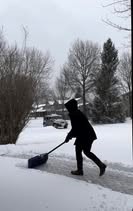 Decreased Visibility
Decreased Visibility
Shorter daylight hours and frequent overcast skies reduce visibility, making it harder to navigate workspaces safely. Stacey Bates Larocque says she always carries a shovel with her and dressing in black keeps the high contrast look going- a silhouette against the white snow!
Snow? The show must go on! Shovelled quickly before my rental company arrives, keep them happy and safe!- Equipment Challenges
Cold temperatures can affect the performance of tools and materials, leading to potential malfunctions.
Travel Complications
Transporting staging equipment during icy or snowy conditions requires extra precautions to avoid accidents.
- Decreased Visibility
Shorter daylight hours and frequent overcast skies reduce visibility, making it harder to navigate workspaces safely. Stacey Bates Larocque says she always carries a shovel with her and dressing in black keeps the high contrast look going- a silhouette against the white snow!
Snow? The show must go on! Shovelled quickly before my rental company arrives, keep them happy and safe! - Equipment Challenges
Cold temperatures can affect the performance of tools and materials, leading to potential malfunctions.
Travel Complications
Transporting staging equipment during icy or snowy conditions requires extra precautions to avoid accidents.

Ellen Mann – We travelled with a good broom, a shovel and hand warmers when we were in Calgary. And after staging in -30 a few times we added clauses to our contract to stipulate the driveway had to be shoveled, ice cleared and the heat and hot water on. We also added a clause stating that we could cancel if the weather was below -20 for the safety of my team. Our busiest week ever (drive to one house, destage then drive to another and stage using the same items for 6 days in a row) came after a huge dump of snow, and an overnight plunge in temperature to -30. That was when we decided we were moving to Vancouver Island.
Conduct Risk Assessments
Consider delaying your trip until the weather improves. Snow plow operators need time to clear the roads. If you must travel, be sure to check the current and forecast weather conditions and monitor the media for weather and road conditions.
- Evaluate the worksite for potential hazards such as icy pathways, snow-covered structures, or unstable surfaces. Identify areas requiring de-icing, additional lighting, or temporary coverings.
 Judith Carsen – I always have a bag of sand or litter in my van in the cold weather. Lock de-icer is handy too. I also make sure that the client understands they are responsible for shoveling and clearing the snow from walkways. It doesn’t always work but most of the time it does.
Judith Carsen – I always have a bag of sand or litter in my van in the cold weather. Lock de-icer is handy too. I also make sure that the client understands they are responsible for shoveling and clearing the snow from walkways. It doesn’t always work but most of the time it does.
Dress Appropriately
Be sure to dress for winter even though you’ll be in your car. You’ll be protected if you become stranded. Wear insulated, weatherproof clothing to retain body heat and protect against cold winds. Use thermal gloves to protect your hands while maintaining dexterity for tasks.
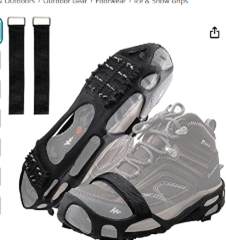 Invest in non-slip, waterproof footwear to maintain stability on icy surfaces. . A $20 on Amazon or less solution is to buy cleats for your shoes/boots.
Invest in non-slip, waterproof footwear to maintain stability on icy surfaces. . A $20 on Amazon or less solution is to buy cleats for your shoes/boots.
Ice Cleats for the snow…
Equip Your Team
- Provide safety gear such as helmets, harnesses, and reflective vests for low-visibility conditions.
- Keep emergency supplies like blankets, hand warmers, and first aid kits readily accessible.
Keep Emergency Supplies in Vehicles
Equip vehicles with winter tires and ensure they have sufficient fuel before each trip.
Stock Up on Essentials
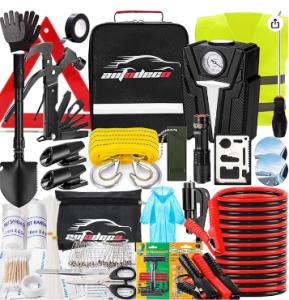 Roadside Car Emergency Kit De-icing agents, snow shovels, and brooms should be part of your winter toolkit. Winter driving survival recommended items include a shovel, thermal blanket, warm clothes, food, booster cables, flashlight, high energy foods, matches and a candle. Test equipment regularly to ensure it functions properly in cold weather.
Roadside Car Emergency Kit De-icing agents, snow shovels, and brooms should be part of your winter toolkit. Winter driving survival recommended items include a shovel, thermal blanket, warm clothes, food, booster cables, flashlight, high energy foods, matches and a candle. Test equipment regularly to ensure it functions properly in cold weather.
 Leigh Anne Chisholm – Always have a shovel, and kitty litter, not salt.
Leigh Anne Chisholm – Always have a shovel, and kitty litter, not salt.
 Marielle Poirier – I always have a shovel, a window scraper/broom, and a pair of cleats (for icy patches) for my boots in the vehicle during the winter months. I start the car remotely so it is warm when I leave.
Marielle Poirier – I always have a shovel, a window scraper/broom, and a pair of cleats (for icy patches) for my boots in the vehicle during the winter months. I start the car remotely so it is warm when I leave.
 Irene Vrbanac-Dzioba – Carry lock de-icer for lockboxes and locks at outdoor storage units.
Irene Vrbanac-Dzioba – Carry lock de-icer for lockboxes and locks at outdoor storage units.
 Christine McKay Shermeto – Always advise and put in the contract heat must be working in the house to be staged.
Christine McKay Shermeto – Always advise and put in the contract heat must be working in the house to be staged.
On-Site Safety Measures
- Prioritize Surface Safety
- Clear pathways of snow and ice before transporting equipment or setting up displays.
- Use anti-slip mats or tapes on potentially hazardous areas.
Johnetta Johns – Ensure hanging ice dams are removed from entry points. Have homeowner place Ram Board paper on flooring at entryway, stairs and hallways.
Monitor Weather Conditions
- Stay informed about weather forecasts and prepare for sudden changes in conditions.
- If severe weather is predicted, consider postponing non-urgent tasks.
Manage Lighting Challenges
- Have heavy duty flashlights in the toolbox and truck in the event there is a power outage or you need to improve visibility in dimly lit areas.
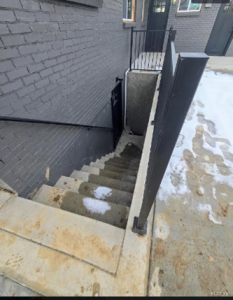 Use Equipment Safely
Use Equipment Safely
- Allow tools and machinery to warm up before use to prevent
malfunctions. - Avoid overloading power sources, which can lead to equipment failure or accidents.
Communicate Effectively
- Ensure all team members are aware of the potential hazards, and emergency protocols.
Transportation and Logistics
- Moving staging equipment in winter requires extra care to prevent damage or delays. Always have your fuel tank full before hitting the road. If you encounter a lengthy traffic delay, you’ll need your vehicle’s heater to stay warm.
Secure Equipment Properly
- Use sturdy straps and covers to protect items from snow, ice, and road debris.
- Inspect vehicles regularly for winter readiness, including tire condition and windshield wipers.
Plan Routes Carefully
- Opt for well-maintained roads and avoid shortcuts through potentially hazardous areas.
- Allow extra travel time to accommodate slower driving speeds.
Cold Weather Health Tips
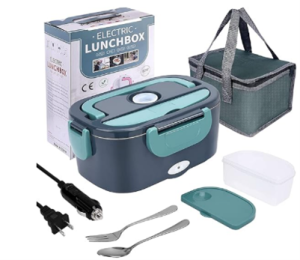 Stay Warm & Stay Hydrated
Stay Warm & Stay Hydrated
Even
in cold weather, dehydration is a risk. Drink plenty of water throughout the day.
Drink warm beverages and eat high-energy snacks to fuel your body.
Maintain Physical Well-Being
Stretch before starting work to improve circulation and flexibility in cold temperatures. Avoid overexertion, which can lead to fatigue and increased vulnerability to cold. Educate team members on first aid for cold-related injuries. Symptoms of hypothermia include shivering, confusion, and slurred speech. Frostbite can cause numbness, discoloration, and hard or waxy-looking skin.
Winter Safety Checklist
- To streamline your winter staging operations, use this checklist as a guide:
- Ensure access to communication devices/phone chargers are in the toolkit
- Keep first aid kits and emergency equipment on-site.
- Winter safety for staging professionals is not just about avoiding accidents—it’s about creating a work environment where efficiency and well-being coexist. By taking proactive measures to address winter-specific risks, you can protect yourself, your team, and your projects from the challenges posed by cold weather.
Be Safe: Remember, preparation and vigilance are your best tools for staying safe. With the right strategies in place, winter can be a productive and secure season for staging professionals. So, gear up, plan ahead, and tackle the season with confidence!

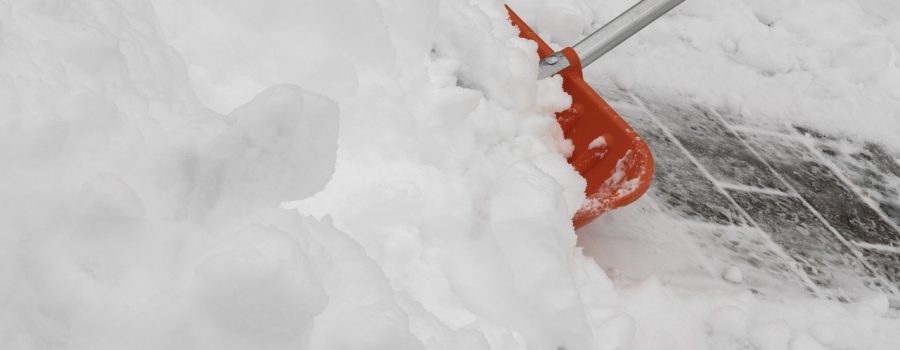













 Subscribe Today!
Subscribe Today! 

